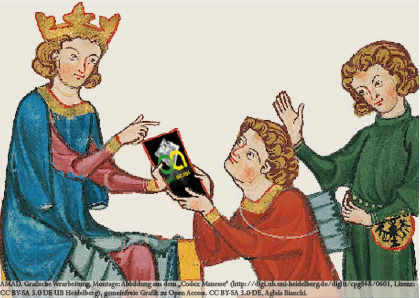AMAD
„Archivum Medii Aevi Digitale - Interdisziplinäres Open-Access-Fachrepositorium und Wissenschaftsblog für Mittelalterforschung‟Zur Einreichung

Langanzeige der Metadaten
| DC Element | Wert | Sprache |
|---|---|---|
| Mitwirkende | The Pennsylvania State University CiteSeerX Archives | - |
| Autor*in | Michael E Mann | - |
| Autor*in | Medieval Climatic Optimum | - |
| Autor*in | John Wiley | - |
| Autor*in | Ted Munn | - |
| Quelle | http://www.meteo.psu.edu/holocene/public_html/shared/articles/medclimopt.pdf | - |
| Quelle | http://citeseerx.ist.psu.edu/viewdoc/summary?doi=10.1.1.365.5600 | - |
| URI | https://www.amad.org/jspui/handle/123456789/76758 | - |
| Beschreibung | Warm Epoch) refers to a period of climatic history during which temperatures in Europe and neighboring regions of the North Atlantic are believed to have been comparable to, or to have even exceeded, those of the late 20th century. This period is conventionally believed to have occurred from approximately 900–1300 AD, terminating with the more moderate conditions of the 15th century, and the Little Ice Age (see Little Ice Age, Volume 1) which impacted Europe during the 16th–mid 19th centuries. The Medieval Climatic Optimum appears to have been in large part a feature of the North Atlantic and neighboring regions (Wigley et al., 1981). Indeed, when Lamb (1965) coined the term Medieval Warm Epoch, it was based on evidence largely from Europe and parts of North America. Regional temperature patterns elsewhere over the globe show equivocal evidence of | - |
| Format | application/pdf | - |
| Sprache | eng | - |
| Rechte | Metadata may be used without restrictions as long as the oai identifier remains attached to it. | - |
| Dewey-Dezimalklassifikation | 940 | - |
| Titel | The Medieval Climatic Optimum (also known as the Little Climatic Optimum, Medieval Warm Period, or Medieval | - |
| Typ | text | - |
| AMAD ID | 568159 | - |
| Open Access | 1 | - |
| Enthalten in den Sammlungen: | BASE (Bielefeld Academic Search Engine) General history of Europe | |
Dateien zu dieser Ressource:
Es gibt keine Dateien zu dieser Ressource.
Alle Ressourcen in diesem Repository sind urheberrechtlich geschützt, soweit nicht anderweitig angezeigt.

